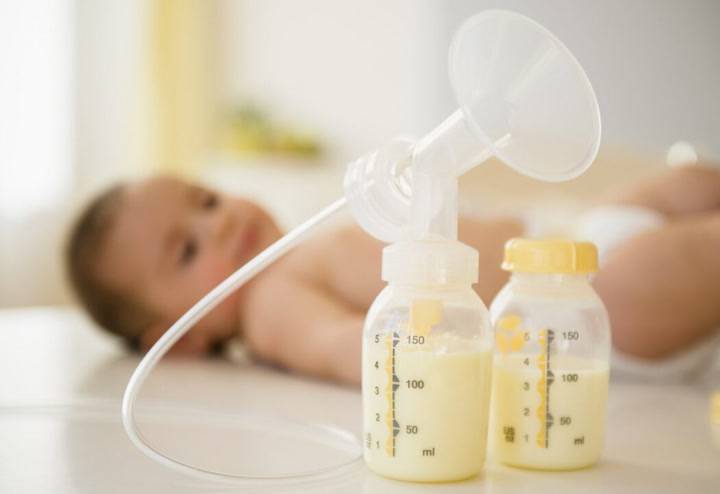The first week after giving birth is pretty exciting but daunting. You’re getting to know your newborn while recovering from delivery. You’re thinking about your milk coming out, plus the baby blues. There’s the pressure of becoming a super mom!

But one of the most important things you’re concerned about is just being with your little one and getting breastfeeding on track—and the baby’s first drink. Know that the first ‘milk out’ is essential. Stay on this page to explore more.
Lactation: How it All Begins
The wonder of producing mother’s milk begins with the process called lactation. In a nutshell, it’s the process of synthesizing milk and secreting it from your mammary glands. Milk is then released from the breasts, your baby’s first drink.
The mechanisms that trigger lactation are truly amazing—a wonder of science! It’s hormonally driven and starts during the second trimester of pregnancy. So, whether you decide to breastfeed or formula-feed your newborn, you will still lactate.
Lactation continues until postpartum. The first drink is important. And you will continue producing breast milk unless, for some reason, you stop doing so.
When Should a Newborn Start Breastfeeding?
Nothing is more heartwarming for a mother than to breastfeed her newborn. The first few tries may not be easy. It’s a learning process. No one’s giving up—until the baby learns to nurse or feed itself.
The first hour after birth is the best time to start breastfeeding your newborn. When the baby latches on the nipples with a rhythmic sucking, it triggers the release of the hormone from the pituitary gland. Hence, the milk supply is initiated.
Enjoy these naked skin-to-skin cuddles. The first drink is a milestone. This is the magical ‘first hour’ of breastfeeding!
However, not all babies behave the same on this first drink. Some babies might suck, while others might not. Despite this, during this first positioning, allow your baby to suck. Let your baby “crawl” to your nipples.
Nursery staff are skilled at helping moms, especially first-time moms, during this magical hour of baby latching. Don’t hesitate to ask for support.

Baby’s First Drink: The Colostrum
The composition of breast milk changes during the first days of lactation. The first drink allows the release of oxytocin, the “love hormone,” between the mother and the baby. This is essential for the release of your first milk—the colostrum.
Why is Colostrum Important?
The baby’s first drink is more than just milk. It’s said to be one of the healthiest drinks for your baby—the newborn’s super meal. It’s packed with goodness—the most balanced mixture of vitamins, fat, and protein. Nothing compares.
Colostrum is high in protein but low in fat and sugar. It has all the nutrients your baby needs in the first few days of life. These are:
- minerals such as magnesium, copper, and zinc for the heart and bones
- Vitamin A for good vision and skin health
- immunoglobulins that help build the immune system.
- white blood cells that produce antibodies
Indeed, colostrum is the first drink for growth and development, as well as protection against infections and diseases. From this perspective, health experts assert that breastfeeding is the best way to help your baby grow healthy.
What does Colostrum Look Like?
Colostrum can be referred to as the first form of breast milk. The baby’s first drink is often called “liquid gold” due to its rich, golden color of yellow or orange, likened to an egg yolk. This is due to the beta-carotene content.
For some mothers, colostrum appears white, clear, or creamy due to its thick consistency. It can also be sticky with faint blood traces, which is normal. Due to this, expressing colostrum by hand for a baby’s first drink could be challenging.
How Long Does Colostrum Last?
Unfortunately, colostrum doesn’t last long. It only lasts between 2-4 days after birth, after which it changes to regular breast milk.
Within 24 hours after delivery, mothers produce a tablespoon to an ounce of colostrum. This volume gradually increases until it disappears on the fifth day. Faint traces may be present in the breast milk for up to six weeks.
For this reason, it’s highly recommended to start breastfeeding your newborn early to catch the “liquid gold” and reap its benefits. The first drink is indeed the best.
How Do You Know If Your Baby Is Getting Colostrum?
Typically, there are no remarkable signs to tell if pregnant women are producing colostrum or not. Some may produce more, while others produce a small amount that’s barely noticeable. However, not producing at all is a rare case.
In some instances, it’s normal for a mom to feel like nothing is coming out and worry that her baby isn’t getting enough. Don’t fret! Your newborn needs only a few teaspoons to fill their tiny tummy.
Other signs to tell if your baby is getting colostrum are if he or she is gradually gaining weight during the first two weeks. Another indicator is if your baby is wetting diapers.

The Baby’s First Drink: Reap These Amazing Benefits
We at Omega Pediatrics are advocates of breastfeeding. For prospective moms, new moms, and moms of our young patients, nothing is comparable to the baby’s first drink. Here, we draw up a list of its amazing benefits.
1. It has a high nutritional value.
Colostrum’s dense composition of nutrients, vitamins, and minerals gives valuable benefits to your newborn. It also contains antibodies to boost your baby’s immune system, which are essential to fighting infections and diseases.
The high nutritional value of colostrum is the most important benefit. This is a perfect explanation for why medical professionals—pediatricians, OB-GYNs, family doctors, midwives, and others—advocate for breastfeeding from an early age.
2. It provides the ideal nutrition for a newborn.
Unlike any other, colostrum is called the super meal of your newborn. It contains the perfect combination of nutrients—enough for your baby’s needs in the first few days of life. It’s in the right amounts, even in tiny doses. Your baby’s tummy doesn’t need a lot!
3. It helps with your newborn’s digestive system.
Colostrum has a low level of fat content, making it easily digestible by sensitive tummies. It also establishes a healthy gut since it provides a protective coating to the intestines, inhibiting harmful bacteria from being absorbed.
Colostrum has a laxative effect, helping your newborn discharge meconium, their first poop. The discharge of clear meconium reduces the chance of jaundice.
4. It prepares your newborn for regular breastfeeding.
Another important benefit of colostrum is that it sets the stage for regular breastfeeding. Though it lasts for only a few days after birth, what adds to its significance is that it prepares your baby for regular breastfeeding.
The flow of colostrum from the mother’s nipples is slow due to its consistency, which is favorable for your newborn to adjust to and learn to breastfeed.
Your newborn only needs smaller amounts of colostrum. This is ideal to allow them to practice the rhythm of sucking, swallowing, and breathing before your regular breast milk flows out naturally in greater quantities.
After the colostrum period, you will feel that your breasts have become firm, tender, and full. This signals that your milk supply is ramping up, and by this time, your baby’s tummy has expanded and is ready to drink more milk during each feeding.
5. It helps prevent low blood sugar in full-term babies.
Colostrum’s nutritional content can help maintain healthy levels of glucose, especially for full-term babies. Low blood sugar can have serious consequences; hence, feeding colostrum early on can help prevent this.
6. Provides long-lasting effects.
Colostrum and regular breastfeeding after that have long-lasting effects on your child. The nutrients they receive from you during breastfeeding help them evolve and develop robust health in their growing years.
A breastfed child seldom gets sick, and if ever they get sick, they can recover quickly with no serious complications. This can favorably impact the child’s school life.
7. It helps mothers recover from childbirth.
And unknowingly, every time your baby breastfeeds, it’s also helping you to recover from the rigors of childbirth. This is because oxytocin induces uterine contractions. During the first drink, it helps to expel your placenta naturally, reducing blood loss.
Regular Breastmilk vs. Colostrum: Their Differences
Aside from being the first breastmilk, colostrum has distinct characteristics that differentiate it from breast milk.
- filled with immunoglobulins for the baby’s immunity
- contains twice as much protein and four times as much zinc
- lower in fat and sugar, making it easily digestible for the newborn
- appears denser and more concentrated yellow
Breastfeed Your Baby Early; The First Drink is the Super Meal
Colostrum is more than just the baby’s first drink. Colostrum is your newborn’s super meal since it contains all the needed nourishment for growth and immunity. Hence, breastfeed your newborn early to reap its benefits.
Another remarkable feature of colostrum is that it sets the stage for regular breastfeeding. It’s produced in smaller quantities, enough for your newborn to digest while practicing the rhythm of sucking to adjust to regular breastfeeding.
Remember, colostrum only lasts for a few days immediately after birth. Hence, your experienced Omega Pediatrics provider highly recommends breastfeeding early to catch the super meal. Nothing equals the benefits colostrum provides.
Give your newborn the healthiest start. A healthy baby means a happy family; thus, it’s crucial to take care of your little one and ensure they get all the nourishment needed for optimal growth and development.
We recognize that breastfeeding is a learned skill. We gladly welcome you to our clinic as we discuss the marvels of breastfeeding. We wanted to ensure that you would have a positive experience with breastfeeding.
Omega Pediatrics has lactation services as one of its offerings. We’re compassionate to the mothers of our young patients as well as moms-to-be. We are with you as you embark on your breastfeeding journey.



